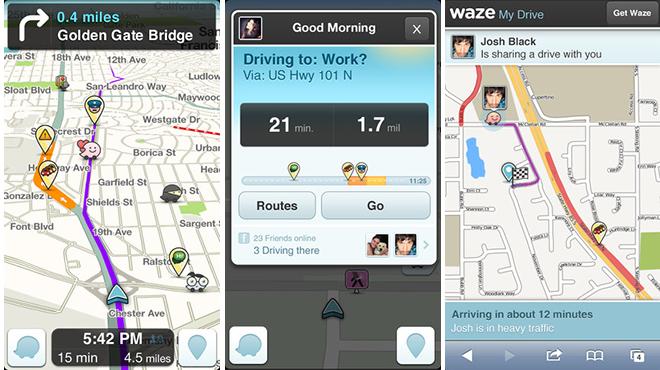According to Bloomberg sources, Google is looking to throw in a $1 billion bid for Waze, possibly portending a bidding war between the search giant and Facebook, which is also rumored to be eyeing an acquisition of the social mapping service.
People familiar with the matter told Bloomberg that Waze is managing "expressions of interest" from multiple parties, and is targeting a selling price of at least $1 billion. Alternatively, the firm may seek venture capital financing in order to stay independent.
A report earlier in May claimed Facebook was in talks to pick up Waze, with the purchase positioning the social network to enter an already cramped market led by Google Maps. Facebook's bid was also said to be around $1 billion.
The sources went on to say that Google only approached Waze after chatter of the Facebook bid went public, suggesting the tech monolith is looking to block Facebook from entering the mapping game.
The publication notes that a deal is far from being reached, and talks may fall apart as Waze's user base is substantial enough to raise funding privately. As of April, Waze had over 40 million people using its service.
In January, Apple too was rumored to be interested in purchasing the startup to bolster its iOS Maps app, but the claims turned out to be false. Sources on Thursday confirmed the Cupertino, Calif., company is not currently part of the talks.
As for Waze's existing investors, the company managed to successfully raise $30 million in a 2011 funding round led by Kleiner Perkins Caufield & Byers and Horizons Ventures Hong Kong. Microsoft is also said to be an investor, as is Magma Venture Partners, Vertex Venture Capital and BlueRun Ventures.
The iOS app is free to download from the App Store, and features TomTom-like functionality like automatic reporting of traffic data. Social aspects include community-generated real-time routing, live maps and an accident reporting system, among others standard navigation features.
 AppleInsider Staff
AppleInsider Staff








 Charles Martin
Charles Martin
 Christine McKee
Christine McKee
 Wesley Hilliard
Wesley Hilliard
 Malcolm Owen
Malcolm Owen
 Andrew Orr
Andrew Orr
 William Gallagher
William Gallagher
 Sponsored Content
Sponsored Content








41 Comments
...but, but, but Google maps are already perfect.
Why would they need to buy another mapping company?
...but, but, but Google maps are already perfect.
Why would they need to buy another mapping company?
I was thinking similar. Not that Google maps was perfect, but what was the point of them buying something else?
heavy rain in NYC today - roads and flooding everywhere, did a control at 5:56pm ET (so sick of the google PR spin map spin machine and sad pathetic "journalists" ) and saved to photos. Once again, since the beginning, I used Apple Maps to get me home. Clean & simple. Tufte would be proud.
Typical of Google &/or Facebook to spend a billion for something worth orders of magnitude less.
Remember Motorola?
I was thinking similar. Not that Google maps was perfect, but what was the point of them buying something else?
Agree. What would Waze have that they (1) want and (2) are willing to pay that much to get? They would have to know Apple isn't interested at that price point and I can't imagine it would be just to keep it out of Facebook's hands? Are they really a threat? What even would Facebook do with them?